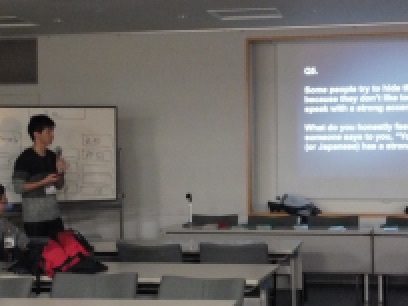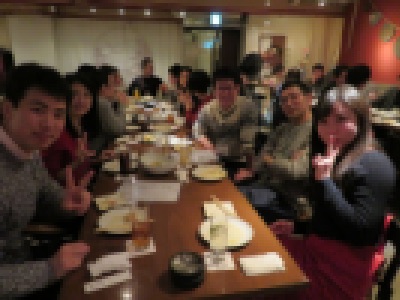1.前半マテリアルの紹介 Kさん

2.忘年会の様子

:::::::::::::::::::::::::::::::::::::::::::::::::::::::::::::::::::::::::::::::
《 今回のworkshop 》
○workshop参加人数:63名(うち新人の方:5名)
○【前半】:Varieties of Japanese and English
○【後半】:Conspiracy Theory
:::::::::::::::::::::::::::::::::::::::::::::::::::::::::::::::::::::::::::::::::
[今週のマテリアル]
≪FIRST HALF≫
Varieties of Japanese and English
Everyone has some sort of dialect when they speak any language, regardless of whether it’s their first language or not. Your way of speaking largely depends on the circumstances where you acquired the language. Here, the circumstances mean where you were born, where you lived for a long time, your family members, your close friends, etc. Just like we all have different backgrounds in our lives, we all should have different ways of speaking. It would be interesting to know how the same language is spoken differently, depending on the area or individual. In this workshop, I would like you to talk about varieties of Japanese and English.
There is one important point when you discuss this topic. Note that there are NO good or bad. Although there are major dialects and minor ones, no dialects or accents are better than others. It is just one of our identities. It’s ok to laugh when it’s funny, but NEVER make fun of it.
*** Instead of brief introduction of each member, start with Question 1.
*** The last 5 min will be spent to share the answer of Question 7.
Here are some key words that might help you talk about this topic.
*Dialect
*Accent
*Vowel
*Consonant
*General American accent
*Rhotic
*Flapping (= T voicing)
*RP (Received Pronunciation) = Queen’s English
*Non-rhotic
*Pitch (in linguistics)
*Putting on accent (方言コスプレ)
*International Phonetic Alphabet (IPA)
Discussion Questions
[Introductory Questions]
1. Share the background of acquisition of your Japanese and English.
(e.g. Where were you born and raised up? What kind of dialects do your parents/caregivers speak? How did you learn English? Any other influence on your languages?)
2. How do you pronounce hashi(bridge), hashi(chopsticks), and hashi(edge)? Try to find the differences in pitch between Kansai Japanese and Tokyo Japanese.
3. Have you ever experienced a situation where you had miscommunication caused by differences in vocabulary or pronunciation? (either in Japanese or English)
4. In which situations do you see people *putting on an accent? What do you think about when Non-Kansai people are putting on Kansai dialect?
[Questions from sociolinguistic point of view]
5. Some people try to hide their accents because they don’t like other people saying “You speak with a strong accent (訛ってる)” to them. What do you honestly feel when someone says to you, “Your English (or Japanese) has a strong accent”?
6. Watch this video. “US president don’t understand Japanese reporter’s English”
(https://www.youtube.com/watch?v=W9VJHLyGGzE)
This scene caused controversial discussion on Twitter. For example, some people criticized Donald Trump for saying “I don’t really understand you” and treating him badly, other people said he should’ve had better English skill to be there (a press conference at The White House after the Mid-term election).
What is your opinion toward this scene?
[Question from phonological point of view]
7. Try to “read” this sentence below written in *IPA. Note that this sentence is based on typical colloquial General American accent, not the one in the dictionary.
ɪfjəwʊdnmaɪn, kænaɪsiəpɑrɾəvjərnuspeɪpər?
≪LATTER HALF≫
Conspiracy Theory
Although conspiracy beliefs can occasionally be based on a rational analysis of the evidence, most of the time they are not. A belief that an event or situation is the result of a secret plan made by powerful people, generally one involving an illegal or harmful act carried out by government.
As a species, one of our greatest strengths is our ability to find meaningful patterns in the world around us and to make casual inferences. We sometimes, however, see patterns and casual connections that are not there, especially when we feel that events are beyond our control.
Another relevant cognitive bias is “projection.” People who endorse conspiracy theories may be more likely to engage in conspiratorial behaviors themselves, such as spreading rumors or tending to be suspicious of others’ motives. If you would engage in such behavior, it may seem natural that other people would as well, making conspiracies appear more plausible and widespread.
The attractiveness of conspiracy theories may arise from a number of cognitive biases that characterize the way we process information. “Confirmation bias” is the most pervasive cognitive bias and a powerful driver of belief in conspiracies. We all have a natural inclination to give more weight to evidence that supports what we already believe and ignore evidence that contradicts our beliefs.
The real-world events that often become the subject of conspiracy theories tend to be intrinsically complex and unclear. Early reports may contain errors, contradictions and ambiguities, and those wishing to find evidence of a cover-up will focus on such inconsistencies to bolster their claims.
Furthermore, people who are strongly inclined toward conspiratorial thinking will be more likely to endorse mutually contradictory theories. For example, if you believe that the Apollo program successfully landed a man on the moon, you are also more likely to believe that they didn’t.
The New World Order is claimed to be an emerging clandestine totalitarian world government by various conspiracy theories.
The common theme in conspiracy theories about a New World Order is that a secretive power elite with a globalist agenda is conspiring to eventually rule the world through an authoritarian world government—which will replace sovereign nation-states—and an all-encompassing propaganda whose ideology hails the establishment of the New World Order as the culmination of history’s progress.
Many influential historical and contemporary figures have therefore been purported to be part of a cabal that operates through many front organizations to orchestrate significant political and financial events, ranging from causing systemic crises to pushing through controversial policies, at both national and international levels, as steps in an ongoing plot to achieve world domination.
The Illuminati
Many influential intellectuals and progressive politicians counted themselves as members. In subsequent use, the “Illuminati” has been referred to various organizations which have claimed to be connected to original secret societies.
Though these links have been unsubstantiated, these organizations have often been alleged to conspire to control world affairs, masterminding events and planting agents in government and corporations; in order to gain political power and influence to establish a New World Order.
Central to some of the more widely known and elaborate conspiracy theories, the Illuminati have been depicted as lurking in the shadows and pulling the strings of power on films, TV shows, comics, video games, and music videos.
In the late 18th century, conspiracy theorists began speculating that the Illuminati had survived their suppression and become the masterminds behind the French Revolution and the Reign of Terror. The Illuminati were accused of being subversives who were attempting to secretly orchestrate a revolutionary wave in Europe and the rest of the world in order to spread the most radical ideas and movements of the Enlightenment.
Fourth Reich
Conspiracy theorists often use the term “Fourth Reich” simply as a pejorative synonym for the “New World Order” to imply that its state ideology and government will be similar to Germany’s Third Reich.
American theorists claim that some ex-Nazis, who survived the fall of the Greater German Reich, along with sympathizers in the United States and elsewhere, given haven by organizations like ODESSA, have been working behind the scenes since the end of World War II to enact at least some principles of Nazism (militarism, imperialism(*1), widespread spying on citizens, corporatism(*2), the use of propaganda to manufacture a national consensus) into culture, government, and business worldwide, primarily in the U.S.
They cite the influence of ex-Nazi scientists brought in under Operation Paperclip to help advance aerospace manufacturing in the U.S. with technological principles from Nazi UFOs, and the acquisition and creation of conglomerates by ex-Nazis and their sympathizers after the war, in both Europe and the United States.
This neo-Nazi conspiracy is said to be animated by an “Iron Dream” in which the American Empire, having thwarted the Judeo-Masonic conspiracy and overthrown its Zionist Occupation Government, gradually establishes a Fourth Reich formerly known as the “Western Imperium”—a pan-Aryan world empire modeled after Hitler’s New Order—which reverses the “decline of the West” and ushers a golden age of white supremacy(*3).
Skeptics argue that theorists grossly overestimate the influence of ex-Nazis and neo-Nazis on American society, and point out that political repression at home and imperialism abroad have a long history in the United States that predates the 20th century. Some political scientists have expressed concern that the twin forces of democratic deficit and superpower status have paved the way in the United States for the emergence of an inverted totalitarianism(*4) which contradicts many principles of Nazism.
Alien Invasion
Since the late 1970s, extraterrestrials from other habitable planets or parallel dimensions and intra-terrestrials from Hollow Earth (such as “Reptilians”) have been included in the New World Order conspiracy, in more or less dominant roles, as in the theories put forward by American writers.
The common theme in these conspiracy theories is that aliens have been among us for decades, centuries or millennia, but a government cover-up enforced by “Men in Black” has shielded the public from knowledge of a secret alien invasion. Motivated by imperialism, these aliens have been and are secretly manipulating developments and changes in human society in order to more efficiently control and exploit human beings.
In some theories, alien infiltrators have shapeshifted into human form and move freely throughout human society, even to the point of taking control of command positions in governmental, corporate, and religious institutions, and are now in the final stages of their plan to take over the world.
A mythical covert government agency of the United States code-named Majestic 12 is often imagined being the shadow government which collaborates with the alien occupation and permits alien abductions, in exchange for assistance in the development and testing of military “flying saucers” at Area 51, in order for U.S. armed forces to achieve full-spectrum dominance.
Skeptics, who adhere to the psychosocial hypothesis for unidentified flying objects, argue that the convergence of New World Order conspiracy theory and UFO conspiracy theory is a product of not only the era’s widespread mistrust of governments and the popularity of the extraterrestrial hypothesis for UFOs but of the far right and ufologists actually joining forces.
The only positive side to this development is that, if conspirators plotting to rule the world are believed to be aliens, traditional human scapegoats (Freemasons, Illuminati, etc.) are downgraded or exonerated.
Introductory question
There are some movies or TV programs whose subjects are conspiracy. (The Da Vinci Code, JFK, The X-Files, Conspiracy Theory(邦題:陰謀のセオリー), etc.)
Have you ever watched some of them? And if you have, how did you feel about them?
Discussion Questions
The New World Order superstate labeled as rotten, why so?
What are the differences between supremacy and totalitarianism?
What are the similarities between imperialism and corporatism?
What is the result of ambiguity and contradictions?
Explain how an alien invasion would affect your community?
CREDITS
Google.com
Wikipedia.com
YouTube.com
Wordpress.com
補足説明
(*1)imperialism:帝国主義
ある国家が政治力・経済力・軍事力等を背景に、領土や勢力範囲拡大を目指して他民族や他国家を侵略・抑圧する活動・政策。
(*2)corporatism:コーポラティズム・協調主義
国家や社会などの集団の、有機体的な関連性と相互の協調を重視する思想・体制。共同体を人間の身体(corpus)のようにみなし、個々人同士の有機体的連帯と機能的役割分担をその基礎としている。
(*3)white supremacy:白人至上主義
白人がそれ以外の人種より優れているとする思想。代表的な例としては、ナチスのアーリア人至上主義、オーストラリアの白豪主義、アメリカのKKK(クー・クラックス・クラン)などが挙げられる。
(*4)totalitarianism:全体主義
個人の利益よりも全体の利益を優先する思想・体制。個人は全体を構成する部分であり、全体に尽すことによってのみ個人の利益が増進するという前提に基づく。
***********************************************************
私たちと一緒に英語コミュニケーション能力を鍛えませんか?
ご興味を持たれた方は、
入会申込フォーム
https://english-speaking-club.com/cms/?page_id=93
よりお申し込みください。お待ちしています!
***********************************************************